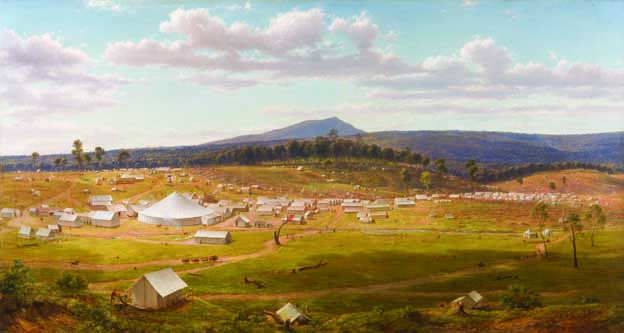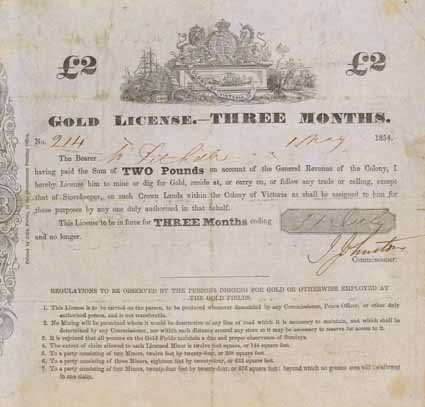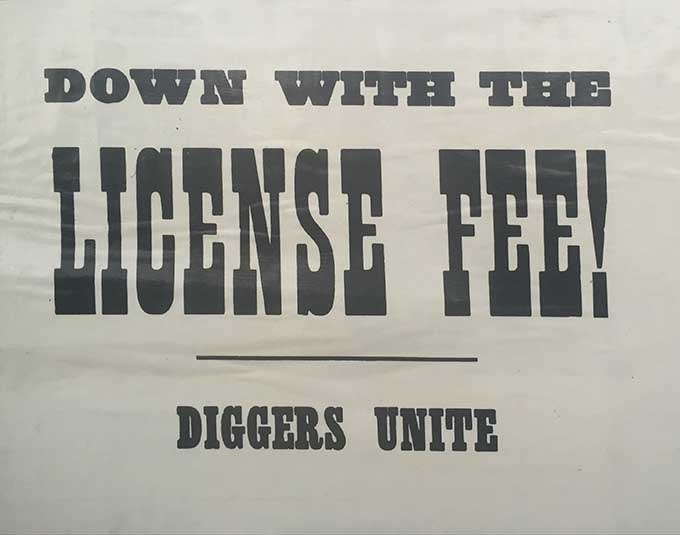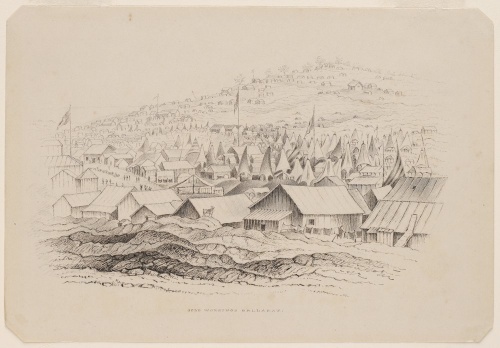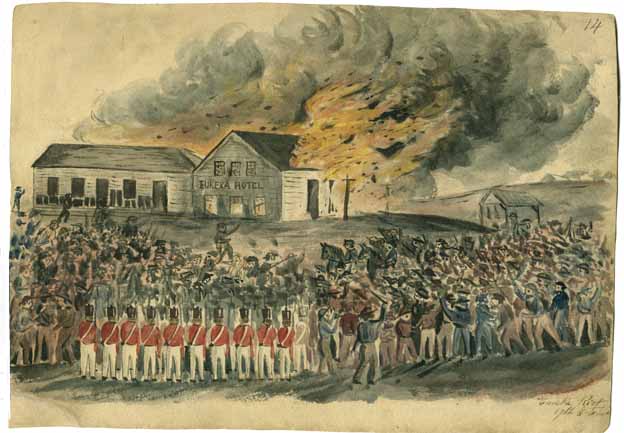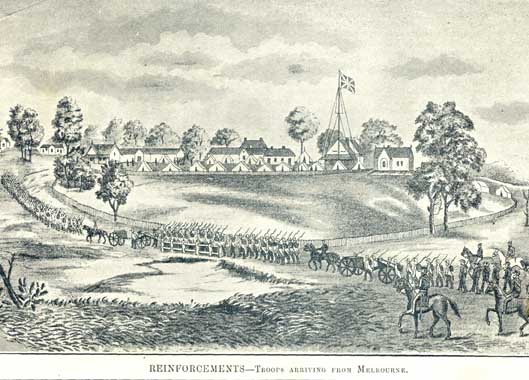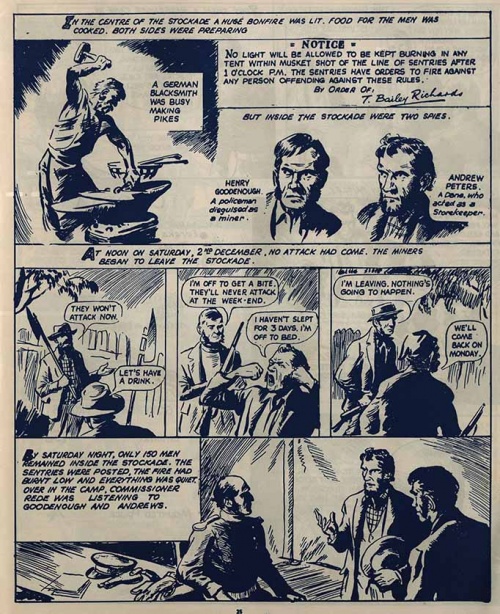Eureka Timeline
How to cite this page http://www.eurekapedia.org/index.php?title=Special:CiteThisPage&page=Eureka_Timeline&id=33997
Eureka Timeline
Contents
- 1 1851
- 2 1852
- 3 1853
- 4 1854
- 4.1 March
- 4.2 4 March
- 4.3 11 March
- 4.4 25 March
- 4.5 28 March
- 4.6 May
- 4.7 16 May
- 4.8 June
- 4.9 22 June
- 4.10 August
- 4.11 26 August
- 4.12 13 September
- 4.13 07 October
- 4.14 09 October
- 4.15 10 October
- 4.16 12 October
- 4.17 14 October
- 4.18 15 October
- 4.19 17 October
- 4.20 19 October
- 4.21 21 October
- 4.22 22 October
- 4.23 25 October
- 4.24 27 October
- 4.25 30 October
- 4.26 1 November
- 4.27 02 November
- 4.28 06 November
- 4.29 10 November
- 4.30 11 November
- 4.31 17 November
- 4.32 18 November
- 4.33 23 November
- 4.34 25 November
- 4.35 27 November
- 4.36 28 November
- 4.37 29 November
- 4.38 30 November
- 4.39 02 December
- 4.40 03 December
- 4.41 04 December
- 4.42 05 December
- 4.43 06 December
- 4.44 07 December
- 4.45 08 December
- 4.46 09 December
- 4.47 11 December
- 4.48 12 December
- 4.49 14 December
- 5 1855
- 5.1 January - March
- 5.2 02 January
- 5.3 08 January
- 5.4 10 January
- 5.5 23 January
- 5.6 25 January
- 5.7 February-March
- 5.8 17 February
- 5.9 22 February
- 5.10 28 February
- 5.11 19 March
- 5.12 21 March
- 5.13 22 March
- 5.14 23 March
- 5.15 27 March
- 5.16 12 April
- 5.17 03 May
- 5.18 22 May
- 5.19 12 June
- 5.20 14 July
- 5.21 10 November
- 5.22 22 November
- 5.23 23 November
- 5.24 31 December
- 6 1856
- 7 1884
- 8 1904
- 9 1954
- 10 1974
- 11 1976
- 12 1997
- 13 1998
- 14 1994
- 15 1999
- 16 2004
1851
08 August
Gold discovered at Buninyong by Thomas Hiscock.
26 August
A protest against the gold licence was held at Buninyong.
19 September
Ballarat's first Gold Commissioner, Francis Doveton, arrives at Ballarat.
1852
October
The 40th (2nd Somersetshire Regiment) arrived in Victoria from England at the request of Governor Charles LaTrobe.
1853
January
A small detachment of the 40th Regiment of Foot are sent to various Victorian diggings to augment the police force.
13 June
Bendigo diggers met to protest at the gold license fee and other grievances. It was determined to start collecting signatures for a 'Monster Petition' and an Anit-Gold Licence Association is formed.
16 July
Around 6,000 miners attended an anti-license meeting at Bendigo. They also complain on no legislative representation.[1]
26 July
A delegation from the Bendigo Anti-Gold Licence Association, including George Thomson, Captain Harrison and Captain Brown set off from Bendigo to petition Governor Charles La Trobe News of the growing agitation had been circulating in Melbourne. La Trobe's response was uncompromising. [2]
01 August
The Bendigo Goldfields Petition was presented to Lieutenant-Governor Charles La Trobe. It boasted over 5,000 miners from across the Victorian goldfields and stretched for more than 13 metres in length. In response, the colonial government proposed doubling the cost of a miner's licence and the Governor of Victoria Sir Charles Hotham (1806–1855) ordered more frequent licence inspections. [3]
18 August
Delegates from Sandhust (Bendigo) held meetings in Ballarat at Canadian Gully and Eureka. According to Ballarat Resident Commissioner John Clow the inflammatory speeches did not make a great impression on the Ballarat Diggers. [4]
21 August
A huge meeting was held at Hospital Hill Bendigo. Diggers agree to either offer 10 shillings for the next month's fee, ornot to pay next month's license and wear red ribbons to advertise non-payment of the license fee.[5]
28 August
Another meeting is held at Bendigo when around 2000 miners marched passed the Government Camp at Sandhurst (Bendigo) on their way to View Point. They carried banners and were accompanied by musicians.[6]
30 August
A meeting of the Anti-Gold License Society was held at Jones Creek.[7]
24 September
A new act reduced the licence to 40 shillings for three months,[8] and allows a Licence to be taken out on any day of the month for one, three or twleve month periods.
1854
March
New Constitution Bill for Victoria and Bill to extend the Elective Franchise (conferring vote on holder of 12 months mining licence with certain residence qualifications) sent to England.
4 March
... those residents on the Ballarat Gold Fields presented to me a Memorial on the Subject remonstrating against the measure, and protesting about the payments of what they termed a tax levied on no other class ...[9]
11 March
Following the Memorial and protests the revenue obtained was 5,551 pounds, being Storekeepers Licences 1345 pounds, and Miners Lincences 4206 pounds. On the week ending 18th March the licence fees diminished to 2458 pounds owing to the absence of police. [10]
25 March
Heavy rains and 8 persons found 412 pounds weight in gold at the bottom of a claim 24 feet deep. Because of the rains the collection of licence fees was 873 pounds.[11]
28 March
The Crimean War starts when Great Britain and France declare war on Russia. [12]
May
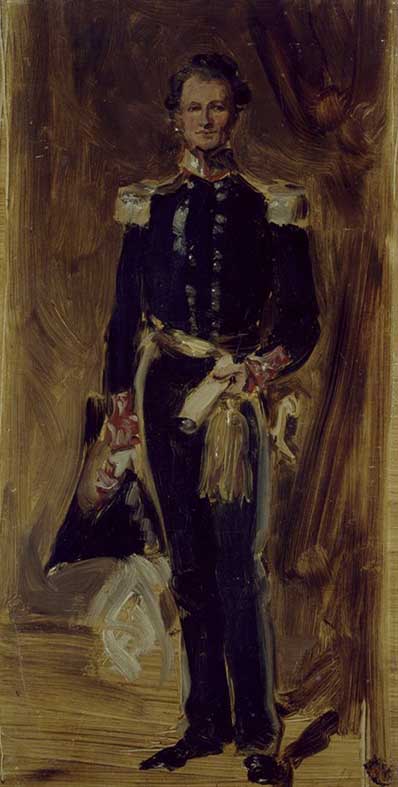
Departure of Governor Charles La Trobe. Henry Foster acts at Lieut-Governor pending Charles Hotham's arrival.[13]
16 May
Chief Commissioner Wright recommends Robert Rede to fill the position of Resident Commissioner at Ballarat. [14]
June
Robert Rede becomes Ballarat’s resident Gold Commissioner, replacing Clow.
Father Patrick Smyth is transferred to St Alipius' Catholic Church.
22 June
Captain Sir Charles Hotham arrives in Melbourne to take up the position of Lieutenant-Governor of Victoria. [15] Hotham faces financial debot, and orders weekly license huts as a revenie raising exercise.
August
Arrival of Governor Charles Hotham.[16]
26 August
Governor Charles Hotham and Lady Hotham visit Ballarat. [17]
13 September
Governor Charles Hotham orders license inspections twice weekly instead of once per month, [18] to further increase revenue. Victoria faces increasing financial difficulties.
07 October
James Scobie was murdered near the Eureka Hotel owned by James Bentley. The inquest was held the same day and despite evidence implicating James Bentley the verdict pronounced James Scobie's wounds were inflicted by an unknown person. [19]
09 October
James Bentley, Catherine Bentley and John Farrell were arrested for the murder of James Scobie.
10 October
Peter Lalor leads a deputatoin of diggers to Commissioner Rede seeking to have the case reopened. Rede agrees.
Johannes Gregorius, the disabled Armenian servant of father Patrick Smyth failed to produce a license when requested by Constable James Lord. The policeman reportedly beat Gregorius. A priest's servant was not required to carry a license.
12 October
Magisterial Enquiry discharges James Bentley [20] due to lack of evidence. Many diggers believe Magistrate John D'Ewes is a friend and business partner of James Bentley.
14 October
A meeting is held at Bendigo to support the Ballarat diggers. The creation of a Goldfields Reform Society is mooted.
15 October
A Monster meeting is held at Bakery Hill after the Catholic church service, to protest at the actions of Trooper James Lord. It is mainly attended by Catholics. There is a resolution to meet again the following Sunday to discuss actions.
17 October
A mass meeting of around 10,000 was held near the site of James Scobie's murder. They wanted a more thorough investigation of his death. As time passed the crowd grew aggressive. The hotel was looted and burnt to the ground. [21] The Police and Military cannot control the crown and Commissioner Robert Rede is pelted with eggs.
19 October
Police reinforcements arrived in Ballarat.
21 October
Andrew McIntyre, and Thomas Fletcher and Westerby were arrested for their alleged part in the destruction of the Eureka Hotel, [22] and charged with riot.[23]
A meeting was held on Bakery Hill where those in attendance agreed to pay the bail Andrew McIntyre and Thomas Fletcher.[24]
Charles MacMahon, acting Head of the Police force, and Police Magistrate E.P.S. Sturt, arrived in Ballarat from Melbourne.
- The correspondent of the Herald writes on the 23rd October: ... A very largely attended meeting was held this day to consider the case of Fletcher and M'Intyre. It was proposed by Mr. Hollyoak, and seconded by Mr. Levison— "That the diggers of Balaarat, sympa-thising with Messrs. Fletcher and M'Intyre, subscribe the necessary funds to secure the best connsel, and defray the general ex penses of the trial. Mr. Kennedy suggested that a tall flag pole should be erected on some conspicuous site, the hoisting of the diggers' flag on which should be the signal for calling toge-ther a meeting on any subject which might require immediate consideration. ... ,ref>07 November 1854.</ref>
22 October
Peter Lalor and Thomas Kennedy stir up diggers at a public meeting after Mass.
25 October
Protest Meeting against the treatment of Father Patrick Smyth's servant, Gregorius.[25]
27 October
Garrison Commander Captain John Thomas developed a detailed plan for the defence of the Government Camp at Ballarat.[26]
Further Military reinforcements arrive from Melbourne.
30 October
Governor Charles Hotham established a board of enquiry into the James Scobie Murder, and the actions of the Camp officials, to quell the unrest. The enquiry sat in Ballarat pm 02 and 10 November.
Governor Charles Hotham releases Frank Carey from prison after approaches by the American consul, James Tarleton. (Macfarlane)
1 November
A Board of Inquiry into Conditions on the Goldfields is set up at Bath's Hotel (later Craig's Hotel), Ballarat.
02 November
A Board of Inquiry appointed by Governor Charles Hotham investigates allegations of corruption at Ballarat begins at Bath's Hotel.
Robert Rede sends forty police back to Melbourne and Geelong.
06 November
Alfred Weir received a membership ticket to the Ballarat Reform League.
10 November
The Riot Enquiry sat for the final time, and a statement was submitted from J.B. Humffray, Frederick Vern, 'Capt'. Charles Ross and Samuel Irwin in the name of the Ballarat Reform League. They blamed the camp for all the problems. The report of the Riot Enquiry expressed general satisfaction with affairs in Ballarat, but they recommended the dismissal of Police Magistrate Dewes and Police Sergeant-Major Milne who were duly removed. (Macfarlane)
11 November
The Ballarat Reform League officially came into existence on this day, although it had been active for several weeks,[27] after 10,000 diggers met on Bakery Hill for public meeting [28]
The meeting expressed regret at recent events, condemned the use of arms by the stockade faction, called on the Crown's officers to show mercy, pledged itself to using constitutional meant to having the miners' grievances addressed and called for a copy of the resolutions to be forwarded to Governor Charles Hotham. The members of the deputation to be to to the Government camp were Thomas Williams (the chairman), Fr Patrick Smyth, J.B. Humffray, Edward Donald and Mr Mostered.[29]
17 November
Governor Charles Hotham announced his attention to appoint a Royal Commission to inquire into the administration of the Gold Fields. [30]
18 November
James Bentley, Thomas Farrell and William Hance were convicted of the manslaughter of James Scobie. Catherine Bentley was found not guilty. [31]
23 November
James Bentley is convicted of manslaughter of James Scobie.[32]
25 November
Andrew McIntyre, Fletcher and Westerby were convicted of 'riot'.[33]
27 November
Ballarat Reform League representatives J.B. Humffray, George Black and Thomas Kennedy met with Governor Charles Hotham to demand the release of the prisoners. [34]
28 November
A detachment of the 12th Regiment entered Ballarat, passing though the Eureka Lead. They were attacked by angry diggers. Drummer John Egan, and civilian transport diver, Young, were wounded.
A dinner was held at Ballarat to the American Consul, James Tarleton. Distant shots were heard during the dinner and officials left hurriedly. James McGill rushed in and whispered a password, thought to be the Celtic 'Faugh-a-balagh' meaning 'clear the way. The diners knew the army was on the way.[35]
29 November
Over 10,000 people attended a 'Monster meeting' at 2.00 pm on Bakery Hill and the Eureka Flag is unfurled.[36] The deputation of diggers report on their meeting with Governor Charles Hotham, and a number of diggers burn their licenses.
https://cv.vic.gov.au/stories/a-diverse-state/eureka-stories/a-meeting-on-bakery-hill-poster/
30 November
In the late afternoon on [Bakery Hill] diggers swore an oath by the Southern Cross to defend their rights.[37] Peter Lalor becomes leader of the diggers and calls for volunteers. Robert Rede reads the Riot act and troops fire a volley over the diggers heads. A number of diggers move to the Eureka Lead and erect a barricade which becomes known as the Eureka Stockade.
The principal speakers at the meeting on 30 November were: Reynolds, Weeks, Salor, Brady, Vern, Quinn, George Black, Wheatley, Murnane, Ross, J.B. Humffray, Kennedy and others. A large body of Police was marched up yesterday evening to the Camp, on Eureka, to watch it, as the night before etc. Six soldiers and police are in hospital, some badly wounded from the effects of Monday evening and night's row.[38]
02 December
The building of the Eureka Stockade was completed.[39] Assistant Commissioner Gilbert Amos of the Eureka Camp was briefly held prisoner by some of the Stockaders and his horse taken.
Father Patrick Smythe tries to persuade Catholics to lay down their arms and attend mass the nest day (Sunday).
03 December
Eureka Stockade battle is fought at dawn led by Captain Thomas, and a well armed contingent of 296 soldiers and Police. Twenty two diggers and seven military are officially lised as killed. Many others are wounded.
A meeting of the Ballarat Reform League was organised for 2pm on 03 December 1854 at the Adelphi Hotel. The intention was to elect a Central Committee of the Ballarat Reform League, and that each 40 members would have the power to elect one member for the Central Committee.[40]
Robert Rede released a Proclamation after the Eureka Battle.
- V.R.
- PROCLAMATION.
- Notice.
- Government Camp,
- Ballarat, December 3rd, 1854
- Her Majesty's forces were this morning fired upon by a large body of evil-disposed persons of various nations who had entrenched themselves in a stockade on Eureka, and some have paid officers and men were killed or wounded. Several of the rioters habve paid the penalty of their crime, and a large number are in custody. All well-disposed persons are requested to return to their ordinary occupations and to abstain from assembling in ground, and every protection will be afforded to them.
- Robert Rede, Resident Commissioner.[41]
04 December
Governor Charles Hotham proclaims martial Law in Ballarat. [42]
Major-General Nickle arrives in Ballarat and takes command. In Melbourne a public meeting of over 4,000 people condemned the actions of the Government and called for the resignation of Foster.
Gunfire from the Government Camp is witnessed. John Wilson writes:
- Tom Wilson came very near to getting shot on Monday night after the Stockade affair. The (Government) Camp took false alarm and kept up a continued fire all over the flat which is densely populated. For maore than 20 minutes the thickest of the fire fell were Tom was living, riddling the tents all around about.
- The ground had been rushed at one time but afterwards left doting the locality over with holes from three to four and five feet deep(one to 1.5 and 1.8 metres), to these holes the inhabitants crowded for safety and Tom among the rest. Unfortunatley the one he got into had been used for a certian purpose - but he won't tell ohow much soap ot cost him to make his clothes nose sweet again though we often ask him.
J.B. Hummfray corroborated these events:
- On the Monday Night, the fourth of this month (December), I was on teh flat a short distance from the bridge her about seven or eight o'clock when I head the rapid and consecutive reports of an immense number of firearms, and I heard a number of bullets whiz over my head, and i sat upon the gound to escape the bullets. Robert Rede released a Proclamation on 03 December 1854 after the Eureka Battle.
05 December
A public meeting was held in Melbourne, at the St Paul's Cathedral, forecourt regarding measures to protect the city after the Eureka Stockade. It was said to be the biggest in the Colony and was convened by the supporters of the Government, following concern after the news of the Eureka Stockade reached Melbourne.
A meeting of around 6000 Melbourne residents meet at St Paul’s Cathedral to condemn the actions taken by the Government and the administrators in Ballarat.
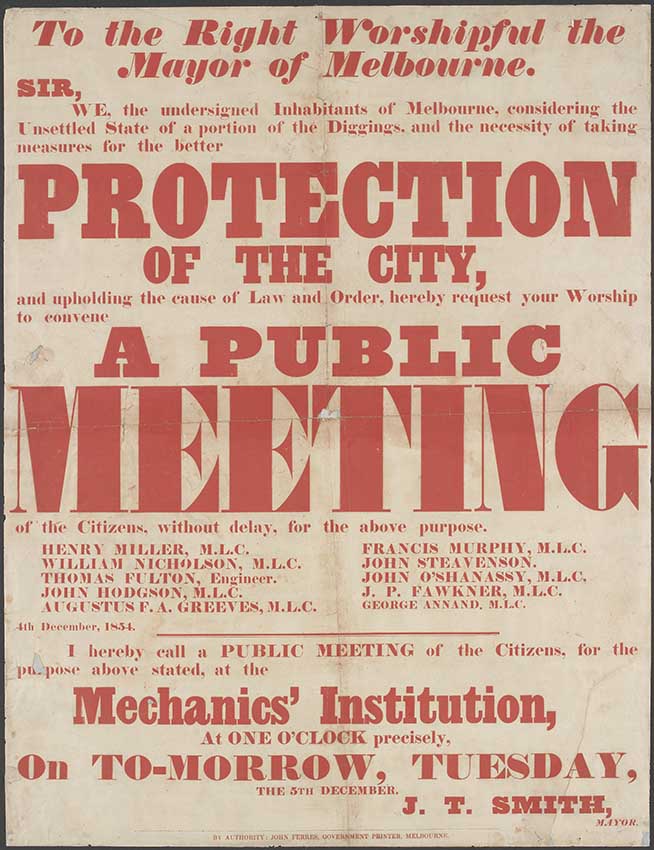
06 December
A group of 13 prisoners are charged with treason.
Colonel Secretary Henry Foster resigns.[44]
Governor Charles Hotham declares a state of martial law in the district of Buninyong which covered Ballarat.[45]
- Head Quarters, Ballarat
- 6th December 1854
- GENERAL ORDER
- Major General Sir Robert Nickle, K.H., Commanding the FOrces in the Australian Colonies, announces to Her Majesty's subjects, Civil and Military, that, acting under the authority of His Excellency, the Lieutenant Governor of Victoria, He has assumed command of the force at Ballarat, to restore confidence and to preserve the lives and property of all peaceful persons.
- The inhabitants are recommended to pursue their ordinary lawful avocations as heretofore.
- Military Law having this day proclained, the Major General directs as follows:
- 1. Stores of every kind may be brought into the District, exept Arms and Ammunition; and any conveyance containing Arms and Military Stores will be confiscated, and the persons in charge will be tried by a general Court Martial.
- 2. All persons in whose possession or on whose premises Arms of Ammunition may be found after Twelve o'clock on the day of Saturday, the Ninth of December, will be tried by a general Court Martial.
- 3. All persons having Arms and Ammunition in their possession, are hereby required to deliver them, by that time, to a Storekeeper at the Camp, appointed to receive, and register, and to give a receipt for the same.
- 4. Should any insult or violence be offered to any Soldier, or Policeman, or any recognised authority, the offending persons will be tried by General Court Martial.
- 5. Should a shot be fired on the Camp, or on any of the above-named authorities, from teh neighbourhood of any Tent, it will be immediately burned down, unless the occupants give such information as shall lead to the conviction of the perpetrators of such outrage, who will, in every case, be tried by a general Court Martial.
- 6. Any persons found lighting a fire, having an appearance of a signal fire, will be tried by a general Court Martial.
- 7. Officers commanding the Force, whether Civil or Military, now serving withinf this District, will receive orders through the medium of the Deputy Adjutant General, and will in like manner make their reports for Sir Robert Nickle's consideration.
- 8. Public Meetings are prohibited, except with the premission of the Major General.
- (By Command,)
- Edward Macarthur,
- Colonel,
- Deputy Adjutant General
- Printed at the "Times" Office, Bakery Hill
07 December
Royal Commission of Inquiry into Goldfields appointed. [46]
A second meeting was held in Melbourne in the Vicinity of St Paul's Cathedral on 07 December, and was sad to the the largest meeting ever held in the Colony. It was convened by those who had sympathy with those under martial law in Ballarat. The meeting concluded with three cheers for the diggers, three cheers for Dr Owens (a speaker and editor), three cheers for Sir Charles Hotham, and three groans for the troopers.
08 December
Ballarat Police Courts commit 13 diggers for trial on charges of high treason.[47]
09 December
Martial Law was repealed at Ballarat.[48]
A meeting of the Castlemaine of the Goldfields Reform League was held, and described as 'the greatest meeting that ever was held in Castlemaine.[49]
11 December
Colonial Secretary Foster resigned.
A rally of 1500 miners, shopkeepers and other took place on Bakery Hill. The meeting expressed regret at the recent stocade fation, called on the Crown's officrs to show mercy, pledged itself to using contitutional meants to having the miners' grievances addressed and called for a copy of the resolutions to be forwarded to Governor Charles Hotham. J.B. Humffray was arrested.[50]
12 December
Robert Nickle returned to Melbourne, although a large part of the army remained for some time. His health deteriorated, possibly due to his exertions in the Ballarat heat.[51]
14 December
The first Ballarat sitting of the Gold Fields Commission sat at Bath's Hotel, Ballarat.
1855
January - March
Agitation for amnesty of Eureka prisoners.[52]
02 January
Governor Charles Hotham orders Gold License hunts to resume.
06 January
A meeting takes place on Bakery Hill at 4.00 pm. Thousands congregate to hear from their delegates to the Gold Fields Commission. On the motion of J.B. Humffray Mr Rice takes the Chair,[53]
08 January
Members of the Gold Fields Commission meet with Governor Charles Hotham informing him that even though their investigations were not complete they were unanimous in recommending the abolition of the Gold Licence.
10 January
Members of the Gold Fields Commission recommend to Governor Charles Hotham that a general amnesty for all those connected with the Eureka Stockade be declared. The request is refused.
- The License Hunt Again. — A public meeting will be held on Bakery Hill, at four o'clock on Wednesday 10th January, 1855. Diggers of Ballarat — The Resident Commissioner has announced his intention of coming out to search for unlicensed diggers, on Thursday, 11th instant, and all diggers are invited to attend, and decide upon some peaceable, but united action on the occasion. In accordance with the terms of the foregoing placard, a monster meeting will be held today, at which the question of license hunting and government tergiversation will be freely and fully discussed. I learn that most of the well-disposed diggers will be prepared to act in unison with the advice of the committee of the 'Victorian Reform League,' and that the opposition, though strong and determined, will be conducted by the people on constitutional principles The men of Ballarat have sufficient discrimination to know whence the folly and impolicy of this new move springs, and they are anxious to put the saddle on the right horse, viz. the Lieutenant Governor himself, Yesterday a deputation from the committee of the 'Victorian Reform League' waited upon the Chief Commissioner at the camp, for the purpose of hearing the cause and objects of his notice; but little satisfaction was given, as Charles Wade Sherard, Esq. refused to make any statement in reply, except through tho medium of written documents. To leave no excuse on this question, the Committee have ordered their deputation to present the Commissioner with an authoritative letter on the subject at an early hour this morning and by his answer, in a great measure, may be shaped the course matters will take at the public meeting this evening. Popular indignation is fired up to the highest pitch at this unwarrantable conduct of the Executive, after its having been generally understood, from the proceedings of the Commission of Inquiry, that Sir Charles Hotham was disposed to meet the popular wishes, and listen to the report of his commission, which it is well-known will denounce the collection of the iniquitous license-tax.[54]
23 January
Henry Seekamp, the editor of the Ballarat Times, was tried and found guilty of sedition. On 26 January he was sentenced to six months in prison.[55]
25 January
Henry Seekamp is found guilty of seditious libel, and on 26 March 1855 starts a 6 month prison sentence.
February-March
Thirteen stockaders, with the exception of Thomas Dignum, were tried for treason and found not guilty. [56]
17 February
In Bendigo around 400 people attended a meeting to raise funds for the defence of the Ballarat diggers who had been tried with treason. After the meeting an effigy of Attorney-General, William Foster Stawell, was burned.
22 February
The trials of the thirteen diggers charged with treason commenced in the Melbourne Supreme Court. Thirteen 13 of 125 men arrested after the Eureka Stockade battle were indicted with the hangable offense of high treason. John Joseph was the first to be tried in what was the only treason trials held in the Colony of Victoria.
28 February
John Manning was the second digger of the 13 charged with treason to be tried.
19 March
Timothy Hayes, charged with treason, was tried.
21 March
Raffaello Carboni, charged with treason, was tried.
22 March
Jan Vennik, charged with treason, was tried.
23 March
Henry Reid, James Campbell, William Molloy, Jacob Sorenson and John Phelan, all charged with treason, were tried.
27 March
Gold Fields Commissioner reports in favour of gold fields reform. The Gold License was abolished, Local Courts to be elected by miners and a 'Miners Right' of 1 pound a year which conferred electoral rights. [57] The Miners Right gave miners the right to mine gold and entitled its bearer to a vote in parliamentary elections.[58]
12 April
A public meeting was held at the stump on Bakery Hill to organise a welcome back for the 13 diggers who were acquitted after being tried for treason.
03 May
A benefit was held in Ballarat for Peter Lalor.
- A benefit night was given to Lalor, on Monday last, in the Adelphi Theatre, the professionals and the proprietors of the Adelphi, Messrs Moody, Nicholas & Co., gave their services and the house free. The pieces chosen for the occasion were " Pizzaro," and " My Neighbour's Wife." between which came several airs played by Richty's splendid band, just arrived in the colony, and at present giving concerts in the Prince Albert Hotel. Then came Raeffelo with the Marsailles, Creed Royal with several solos on the flute, and Thatcher with his comic songs. The music was encored most determinedly. Mr Lalor came before the curtain, and briefly thanked them. When he came out there was a perfect hurricane of applause. He lifted his hand, and all was still as death until he had finished his address. The house was crowded to suffocation; all parties, those who agreed with him, and those who did not, for once agreeing io pay him all honour for his sincerity. A very singular phase of the evening's amusement was the presence of nearly as many ladies as gentlemen. The proceeds are handsome; I have not yet heald the figure-probably about £100.
- Last evening's news, though brief, was largely sought after. It would be useless to tell of the opinions and prophecies for good and evil that were uttered. One thing is clearly evident, that if Her Majesty has not in her dominions more disloyal subjects, then she is truly blessed. The existence of this feeling of loyalty, for which Sir Charles himself once gave us credit, and which we never threw aside, speaks volumes in con demnation of the State Trials.[59]
22 May
New Electoral Act framed to give representation to mining areas in existing Legislative Council.[60]
12 June
The third Goldfields' Act was proclaimed, and incorporated the changes suggested by the Royal Commission.
14 July
Raffaello Carboni was one of nine diggers elected to the local court at Ballarat.[61]
10 November
Peter Lalor and J.B. Humffray were elected to the Legislative Council.[62]
22 November
A meeting was held on the site of the Eureka Stockade. Daniel Sweeney was in the Chair to consider the subject of compensation to the sufferers of loss incurred by the soldiers eleven months earlier.[63]
23 November
Governor Charles Hotham proclaims assent of Queen to Constitution Act. [64]
31 December
Governor Charles Hotham dies at Melbourne.
1856
1856
The Colonial Tasmanian Parliament passes the Electoral Act of 1856, the first piece of legislation anywhere in the world using the secret ballot for elections.
In 1856 a meeting was held on Bakery Hill to discuss the erection of a monument to the men who fell at the Eureka Stockade.[65]
May 1856
Costs relating to the Eureka Stockade were released.
- We have Melbourne papers to the 17th. inst, A Council paper, just published, states that an outlay of £26, 733 18s. 6d. was incurred by the Ballarat riots, —the items being as follows : Expenditure for military, £19,871 0s. l0d.; police, £230 18s. ; conjointly for both services, £5119 13s. 8d.; contingencies, £1512 6s.[66]
03 December 1856
John Lynch gave an oration on the site of the Eureka Stockade. There was a small procession to the site, and about 200 people assembled. At the conclusion of the oration a procession then marched to teh Ballaarat Old Cemetery where another oration was presented by Dr Harry Hambrook.[67]
1884
16 April
The Eureka Stockade Memorial Committee met for the first time. They decided to invite designs for a memorial. [68]
1904
50th Anniversary of the Eureka Stockade.
1954
A Eureka Pagent was held at Sovereign Hill, near Golden Point. Part of Sovereign Hill was levelled for the mock battle. Around 20 year later it would become the site of the outdoor museum of the same name.
1974
The Eureka Stockade Association signed articles of incorporation in July 1974. The signatories were Cr Gordon Cornell, Alec Barnett and Bruce Bartrop.[69]
1976
November 1976
The Save Bakery Hill campiagn became active, and campiagned aagainst the demolition of buildings on Bakery Hill solidly for eight months.[70]
1997
The Eureka Stockade Centre Appeal edged towards the one million dollar mark. The appeal director was Barry Tinkler and the appeal committee chair was Pam Davies.[71]
1998
27 March
The Eureka Stockade Centre was officially opened by Premier Jeff Kennett.
1994
Paul Williams founded the Eureka Stockade Memorial Association to promote the national significance of Eureka, and to bring together the diverse political and ethnic interest.
The first dawn lantern walk.
1999
Unveiling of the statue of the Eureka Pikeman's dog at the Eureka Stockade Centre. The bronze statue is by Charles and Joan Fox.
2004
Southern Cross flags were flown in Commonwealth Avenue in Canberra, outside Parliament House, in recognition of the 150th anniversary of the Eureka Stockade.[72]
How to cite this page http://www.eurekapedia.org/index.php?title=Special:CiteThisPage&page=Eureka_Timeline&id=33997
- ↑ Ian McFarlane, Eureka From the Official Records, PROV, 1995.
- ↑ Frank Cusack, Bendigo, A History, Lerk and McClure, 2002.
- ↑ http://www.myplace.edu.au/decades_timeline/1850/decade_landing_15_1.html?tabRank=2&subTabRank=2, accessed 19 October 2016.
- ↑ Ian McFarlane, Eureka From the Official Records, PROV, 1995.
- ↑ G. Mackay, History of Bendigo, Lerk and McClure, 2000.
- ↑ Ian McFarlane, Eureka From the Official Records, PROV, 1995.
- ↑ Ian McFarlane, Eureka From the Official Records, PROV, 1995.
- ↑ McFarlane, Ian, Eureka from the Official Records, Public Record Office of Victoria, 1995, p 190
- ↑ Dorothy Wickham, Research & Notes 1996, A2343, p. 2368
- ↑ Dorothy Wickham, Research & Notes 1996, A2343, p. 2453
- ↑ Dorothy Wickham, research 1996, A2343
- ↑ McFarlane, Ian, Eureka from the Official Records, Public Record Office of Victoria, 1995, p 190
- ↑ Rich, Margaret (Ed), Eureka, Ballarat Fine Art Gallery.
- ↑ McFarlane, Ian, Eureka from the Official Records, Public Record Office of Victoria, 1995, p 190
- ↑ McFarlane, Ian, Eureka from the Official Records, Public Record Office of Victoria, 1995, p 191
- ↑ Rich, Margaret (Ed), Eureka, Ballarat Fine Art Gallery.
- ↑ McFarlane, Ian, Eureka from the Official Records, Public Record Office of Victoria, 1995, p 191
- ↑ Rich, Margaret (Ed), Eureka, Ballarat Fine Art Gallery.
- ↑ McFarlane, Ian, Eureka from the Official Records, Public Record Office of Victoria, 1995, p 192
- ↑ Rich, Margaret (Ed), Eureka, Ballarat Fine Art Gallery.
- ↑ McFarlane, Ian, Eureka from the Official Records, Public Record Office of Victoria, 1995, p 192.
- ↑ McFarlane, Ian, Eureka from the Official Records, Public Record Office of Victoria, 1995, p 193.
- ↑ Rich, Margaret (Ed), Eureka, Ballarat Fine Art Gallery.
- ↑ McFarlane, Ian, Eureka from the Official Records, Public Record Office of Victoria, 1995, p 193.
- ↑ Rich, Margaret (Ed), Eureka, Ballarat Fine Art Gallery.
- ↑ McFarlane, Ian, Eureka from the Official Records, Public Record Office of Victoria, 1995, p 193.
- ↑ McFarlane, Ian, Eureka from the Official Records, Public Record Office of Victoria, 1995, p 194.
- ↑ Rich, Margaret (Ed), Eureka, Ballarat Fine Art Gallery.
- ↑ Eureka 150, Ballarat Courier Supplement, 24 November 2004.
- ↑ Rich, Margaret (Ed), Eureka, Ballarat Fine Art Gallery.
- ↑ McFarlane, Ian, Eureka from the Official Records, Public Record Office of Victoria, 1995, p 194.
- ↑ Rich, Margaret (Ed), Eureka, Ballarat Fine Art Gallery.
- ↑ Rich, Margaret (Ed), Eureka, Ballarat Fine Art Gallery.
- ↑ McFarlane, Ian, Eureka from the Official Records, Public Record Office of Victoria, 1995, p 195.
- ↑ Corfield, J., Wickham, D., & Gervasoni, C. The Eureka Encyclopaedia, Ballarat Heritage Services, 2004.
- ↑ McFarlane, Ian, Eureka from the Official Records, Public Record Office of Victoria, 1995, p 195.
- ↑ McFarlane, Ian, Eureka from the Official Records, Public Record Office of Victoria, 1996, p 196.
- ↑ Dorothy Wickham Notes and Research, 1996, Dixson Library, A2343, after p. 2453
- ↑ Rich, Margaret (Ed), Eureka, Ballarat Fine Art Gallery.
- ↑ From Tent To Parliament, Berry Anderson & Co., Ballarat, p12.
- ↑ Eureka 150, Ballarat Courier Supplement, 24 November 2004.
- ↑ McFarlane, Ian, Eureka from the Official Records, Public Record Office of Victoria, 1996, p 197.
- ↑ Eureka 150, Ballarat Courier Supplement, 24 November 2004.
- ↑ Rich, Margaret (Ed), Eureka, Ballarat Fine Art Gallery.
- ↑ Eureka150, Ballarat Courier Supplement, 24 November 2004.
- ↑ Rich, Margaret (Ed), Eureka, Ballarat Fine Art Gallery.
- ↑ Rich, Margaret (Ed), Eureka, Ballarat Fine Art Gallery.
- ↑ Rich, Margaret (Ed), Eureka, Ballarat Fine Art Gallery.
- ↑ The Argus, 15 December 1854.
- ↑ Eureka150, Ballarat Courier Supplement, 24 November 2004.
- ↑ Gervasoni, Clare and Ford, Tina, Eureka Stockade centre Hall of Debate Kit, 1998.
- ↑ Rich, Margaret (Ed), Eureka, Ballarat Fine Art Gallery.
- ↑ The Age, 9 January 1855.
- ↑ The Age, 11 January 1855.
- ↑ Gervasoni, Clare and Ford, Tina, Eureka Stockade centre Hall of Debate Kit, 1998.
- ↑ McFarlane, Ian, Eureka from the Official Records, Public Record Office of Victoria, 1996, p 199.
- ↑ Rich, Margaret (Ed), Eureka, Ballarat Fine Art Gallery.
- ↑ http://www.myplace.edu.au/decades_timeline/1850/decade_landing_15_1.html?tabRank=2&subTabRank=2, accessed 19 October 2016.
- ↑ Geelong Advertiser, 04 May 1855.
- ↑ Rich, Margaret (Ed), Eureka, Ballarat Fine Art Gallery.
- ↑ McFarlane, Ian, Eureka from the Official Records, Public Record Office of Victoria, 1996, p 200.
- ↑ McFarlane, Ian, Eureka from the Official Records, Public Record Office of Victoria, 1996, p 200.
- ↑ Ballarat Courier, 15 May 1954.
- ↑ Rich, Margaret (Ed), Eureka, Ballarat Fine Art Gallery.
- ↑ William Withers, History of Ballarat, p.105.
- ↑ Tasmanian Daily News, 22 May 1856.
- ↑ Ballarat Courier, 15 May 1954.
- ↑ Chisholm, J.A., A few notes o the site of the Eureka Memorial, 1974.
- ↑ Ballarat Courier, 27 July 1974.
- ↑ Paul Morrison & Trevor Owens, Bakery Hill - Past and Present : A Social Documentary, Ballarat College of Advanced Education Thesis, 1978.
- ↑ Ballarat Courier, 28 November 1997.
- ↑ The Age, 03 December 2004.
